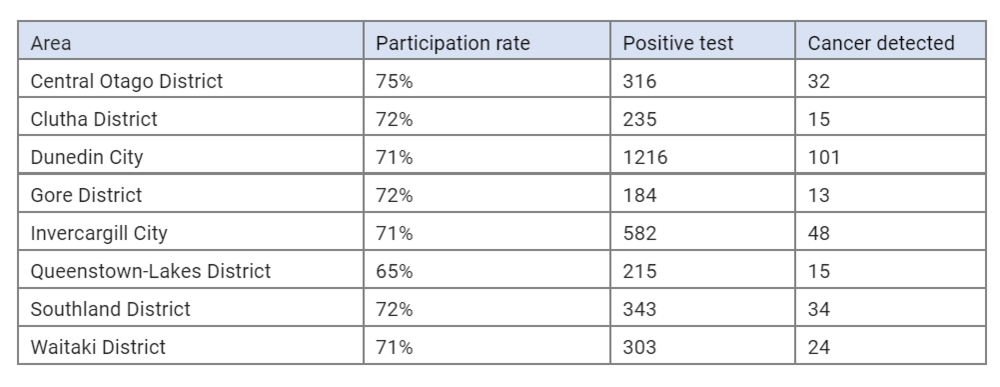Thousands of cancers prevented as Southern Bowel Screening Programme marks anniversary
Staff Reporter
26 April 2022, 7:30 PM
 The Dunedin-based National Bowel Screening Team
The Dunedin-based National Bowel Screening TeamAs the Southern DHB’s National Bowel Screening Programme (NBSP) marks its fourth anniversary, the team is reflecting on the success of the Programme in detecting and preventing bowel cancers across the district.
Since inception, the Southern NBSP has detected 282 cases of bowel cancer and resulted in more than 2200 participants having polyps removed which, untreated, can develop into cancer over time.
“Early detection is important,” explains Dr Jason Hill, Clinical Lead of the Southern NBSP. “Cancers that are diagnosed early can be treated much more successfully, reducing the need for surgery, chemotherapy and radiation therapy. Once people with cancer become symptomatic, this usually means their cancers are more advanced.”
Another complicating factor is that there are no ‘diagnostic’ symptoms of bowel cancer. “Only around one in 20 people who have symptoms typically associated with bowel cancer will be found to have the disease,” he says. “In participants, without symptoms, who return a positive screening test in the first round through the National Bowel Screening Programme in the Southern district, around one in 9 will have bowel cancer. That is why this Programme is so important.”
Genevieve Cowley, NBSP Nurse Coordinator, says one of the best parts of her job is working with those who return a positive test and seeing how much they appreciate the prompt care they receive. “People are really grateful to be a part of the Programme and are reassured with the speed in which the Programme runs,” she says. “They have a sense of confidence knowing that any concerns will be picked up sooner rather than later.”
The Programme team has focused its efforts on maintaining strong participation rates – the overall participation rate exceeds the national target of 60%, as does the rate of participation among Māori and Pasifika residents.
• Southern residents have completed and returned more than 70,000 test kits since the Programme began
• Overall participation sits at 71%
• The overall rescreening rate (after two years) is 79%
• Māori participation is 76%, with a rescreening rate of 79%
• The rate for Pasifika participation is 70%, and 77% for rescreening.
Programme Manager, Emma Bell, says equity of participation has been a core focus since the Southern NBSP began in April 2018.
“We have engaged closely with Māori and Pasifika communities throughout the district, partnering with Māori and Pasifika health providers and attending face-to-face gatherings and cultural events to discuss the importance of bowel screening and to answer questions directly,” she says. “This has been one of the most encouraging and rewarding parts of working on the Programme.”
Participation rates across all of the Southern territorial authority areas also exceed the 60% target.

The staging of cancers that have been found is recorded below. The finding of early-stage cancers is an important aspect of the NBSP as it reflects finding cancers when they are more likely to be able to be successfully treated.

Screening is free for those aged 60 to 74 years of age who are eligible for public healthcare, and those within this range are invited to retest every two years.
“Regular screening is important as polyps and cancers may not bleed all the time and may therefore not lead to a positive screening test result,” says Emma Bell.
About the National Bowel Screening Programme
• Screening can detect cancer at an early stage when it can often be successfully treated
• Screening is free for those aged 60 to 74 years of age who are eligible for public healthcare
• Invitations for those eligible to participate are sent through the mail, followed by a test kit
• The kits are easy and simple to do at home, and samples are returned by mail for testing
• If any member of the public notices potential symptoms – such as a change in their normal bowel habit that continues for several weeks, or blood in a bowel motion – they should see their GP right away, not wait for their screening test.
About bowel cancer in New Zealand
• New Zealand has one of the highest rates of bowel cancer in the developed world
• More than 3000 New Zealanders are diagnosed with bowel cancer each year and more than 1,200 die from it annually
• Bowel cancer is the second most common cause of cancer death in this country
• According to the Ministry of Health, people diagnosed with early-stage bowel cancer who receive treatment early, have a 90% chance of long-term survival.
For more information visit timetoscreen.nz or freephone 0800 924 432.


